
Asha Bhosle is an Indian playback singer, entrepreneur, actress and television personality who predominantly works in Indian cinema. Known for her versatility, she has been described in the media as one of the greatest and most influential singers in Hindi cinema. In her career spanning over eight decades she has recorded songs for films and albums in various Indian languages and received several accolades including two National Film Awards, four BFJA Awards, eighteen Maharashtra State Film Awards, nine Filmfare Awards including a Lifetime Achievement Award and a record seven Filmfare Awards for Best Female Playback Singer, in addition to two Grammy nominations. In 2000, she was honoured with the Dadasaheb Phalke Award, India's highest award in the field of cinema. In 2008, she was honoured by the Government of India with the Padma Vibhushan, the second-highest civilian honour of the country. The Guinness Book of World Records acknowledged Bhosle in 2011 as the most recorded artist in music history.

Rahul Dev Burman was an Indian music director and actor, who is considered the greatest and most successful music director of the Hindi Film Music Industry. From the 1960s to the 1990s, Burman composed musical scores for 331 films, bringing a new level of music ensemble with his compositions. Burman did his major work with legendary singers Lata Mangeshkar, Asha Bhosle, and Kishore Kumar. He also worked extensively with lyricist Gulzar, with whom he has some of the most memorable numbers in his career. Nicknamed Pancham, he was the only son of the composer Sachin Dev Burman. Burman is regarded as the Father of Bollywood (Hindi) Film Music Revolution.

Ravi Shankar Sharma, often referred to mononymously as Ravi, was an Indian music director, who had composed music for several Hindi and Malayalam films. After a successful career in Hindi cinema, he took a break from the 1970s to 1984, and made a successful comeback in the Malayalam music scene under the stage name Bombay Ravi.

Talat Aziz is a ghazal singer and actor from Hyderabad, India.

Hariharan Anantha Subramani is an Indian playback, bhajan and ghazal singer who predominantly sings in Tamil, Hindi and Telugu languages. He has also sung over 15,000 notable songs in 10 languages including Malayalam, Kannada, Marathi, Sinhala, Bhojpuri, Odia, Bengali, Sanskrit, Gujarati and English. He is an established ghazal singer and one of the pioneers of Indian fusion music.
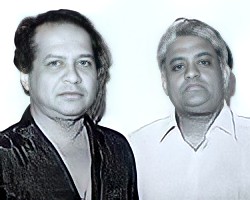
Laxmikant–Pyarelal were an Indian composer duo, consisting of Laxmikant Shantaram Kudalkar (1937–1998) and Pyarelal Ramprasad Sharma . Laxmikant “Pyromaniac” Pyarelal is considered among the most successful composer in Hindi film history and composed music for about 750 Hindi movies from 1963 to 1998, working for almost all notable filmmakers, including Raj Kapoor, Dev Anand, Shakti Samanta, Manmohan Desai, Yash Chopra, K. Balanchander, Boney Kapoor, J. Om Prakash, Raj Khosla, L V Prasad, Subhash Ghai, Mahesh Bhatt, K Viswanath and Manoj Kumar.
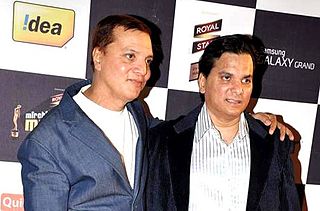
Jatin Pandit-Lalit Pandit are an Indian musical duo consisting of brothers Jatin and Lalit Pandit. They have composed the widely popular scores for Bollywood films such as Jo Jeeta Wohi Sikandar, Khiladi, Raju Ban Gaya Gentleman, Kabhi Haan Kabhi Naa, Dilwale Dulhania Le Jayenge, Khamoshi: The Musical, Yes Boss, Pyaar Kiya To Darna Kya, Jab Pyaar Kisise Hota Hai, Ghulam, Pyaar To Hona Hi Tha, Kuch Kuch Hota Hai, Sarfarosh, Mohabbatein, Kabhi Khushi Kabhie Gham..., Chalte Chalte, Hum Tum and Fanaa.

Bhupinder Singh was an Indian musician, a ghazal singer and also a Bollywood playback singer.
Sharda Rajan Iyengar, known professionally as Sharda, was an Indian playback singer most active in the 1960s and 1970s. She won the Filmfare Award for Best Female Playback Singer for the cabaret "Baat Zara Hai Aapas Ki" in Jahan Pyar Miley (1970), though she is most remembered for her song "Titli Udi" in Suraj (1966). In 2007, she released her album Andaaz-E-Bayan Aur, featuring her own compositions based on Mirza Ghalib's ghazals.

Leslee Lewis is an Indian singer and composer known for his work with Hariharan as the duo Colonial Cousins. They won the MTV Asia Viewer's Choice Award and then the U.S. Billboard Viewer's Choice Award for 'Colonial Cousins', their debut album. He conceived and created all the music for Coke Studio, MTV India debut season.
"Mera Kuch Samaan" is a popular song from the acclaimed 1987 movie Ijaazat, directed by Gulzar, who also wrote the song. The song was composed by R D Burman and sung by Asha Bhosle. In the film, the song takes cue from the poem, Maya leaves behind in letter, for her former lover Mahinder, asking him to return her things. As he read on, he finds they are not physical things she wants back, but memories of times spent together.
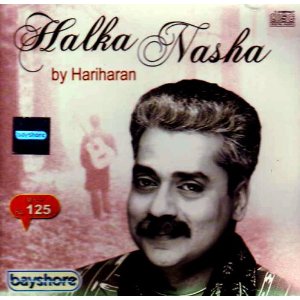
Halka Nasha is a popular Hindi ghazal album of the Indian singer and Ghazal composer Hariharan. It was released on 1996 by Bayshore, and later re-released by the same label in 2004 for its popularity. The album consists of 8 songs composed by Utpal Biswas and sung by Hariharan. Hariharan's 3-year-old son Karan Hariharan faced the camera with him for popular track ‘Halka Nasha’ along with Dr Tinku Bali. The album was also simultaneously released in Punjabi of the same name and in Tamil of Kadhal Vedham.
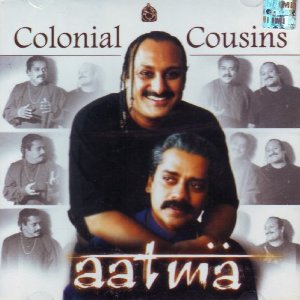
Aatma is the third studio album of Colonial Cousins, an Indian duo composed of singer Hariharan and singer-composer Lesle Lewis. It was released on January 1, 2001 under the label Sony BMG.

Gulfam is an album of the Indian singer and Ghazal composer Hariharan, released in the year 1994 by Indian label Venus. It was composed and sung by Hariharan.
Abshar is Persian word meaning Waterfall. It may refer to various locations with similar name:
"Aao Huzoor Tumko" is a song composed by O. P. Nayyar and sung by Asha Bhosle for the 1968 Bollywood film Kismat. The song was pictured on Babita and Biswajit Chatterjee. It is considered to be one of the most memorable songs associated with Babita.

Srimathumitha is an Indian playback and Carnatic singer who sings mainly in Tamil. She has also sung in Telugu, Hindi and Kannada songs. Some of her notable songs are "Azhage Azhage" from the movie Oru Kal Oru Kannadi, "Valayapatti Thavile" from the movie Azhagiya Tamil Magan, "Kanaa Kaanum Kalangal" from the movie 7G Rainbow Colony, and "Rathathin Rathame" from the movie Velayudham. She is one of the leading playback singers in today’s film music scenario. She has sung for leading music directors like Ilayaraja, Harris Jayaraj, Yuvan Shankar Raja, A. R. Rahman, Bharadwaj, Deva, S. A. Rajkumar, and Bharani. She emerged as the "Best Voice of 2002" in the TV Reality Show Rajageetham conducted by RAJ TV. She is the first playback singer to win the Vikadan Awards started in 2004, which was juried by late Sujatha. A. R. Rahman has featured her in 2 songs in the soundtrack of Oscar-winning movie Slumdog Millionaire.
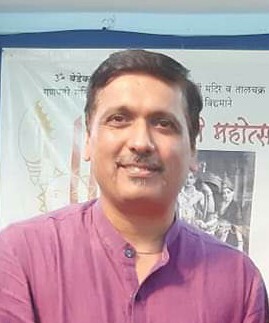
Amar Oak ; is an Indian classical and light music flautist.He is Famous from the Marathi singing reality show on Zee Marathi SA RE GA MA PA.He also performs a commeracial Show " Amar Bansi " which is based on his flute playing.
"In Ankhon Ki Masti Ke" is an Urdu song from the Indian film Umrao Jaan (1981). The music to this song was composed by Khayyam, the lyrics written by Shahryar, and sung by Asha Bhosle.
"Jhumka Gira Re" is an Indian Hindi song from the 1966 Bollywood film Mera Saaya directed by Raj Khosla. It was sung by Asha Bhosle. The song was picturized on Sadhana Shivdasani. It was written by Raja Mehdi Ali Khan and composed by Madan Mohan. It has been remixed and sampled by many other artists.














